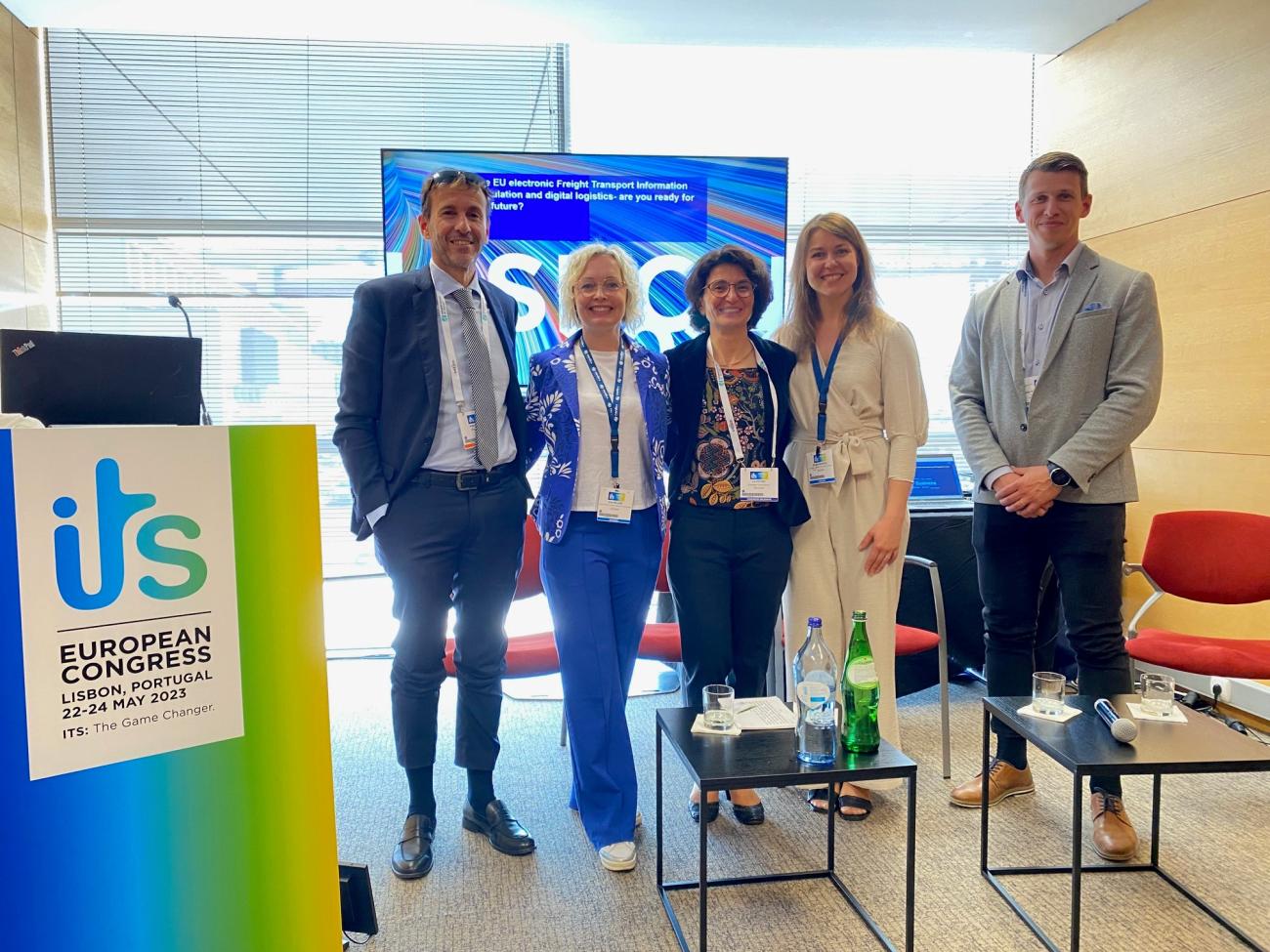
Already for the 15th time, the professionals of Intelligent Transport Systems (ITS) sector were gathering to ITS European Congress. This year the Congress took place from 22nd to 24th May in Lisbon. It is the largest event entirely dedicated to smart mobility and digitalisation of transport and gives a strategic opportunity for the transport industry to come together and share the knowledge and showcase the latest innovations at various panel discussions programme and expo area.
Kristi Aruküla and Eva Killar from Estonian Ministry of Economic Affairs and Communications were proud to present The NDPTL Goes Real-Time Economy eCMR Project financed by Northern Dimension Partnership for Transport and Logistics (NDPTL) Fund and previous eCMR protos at ITS European Congress together with European Commission in a Special Interest Session called “Electronic freight transport information (eFTI) regulation – will it impact you?”.
The session took place on 24th May. The aim of this special interest session was to explain to the transport and logistics stakeholders and public sector authorities the core building blocks of the new information exchange environment and legislation, how the IT system will work together, and most importantly, how this is expected to impact the sector and economics. To discuss both opportunities and challenges, we brought on stage representatives of the European Commission, national authorities, IT service providers and logistics operators, with hands-on experience in the on-going preparatory work on the eFTI exchange environment implementation.
Lia Potec from the European Commission emphasised as a current problem statement that electronic consignment notes are very rarely used, and that is the case in all modes of transport. And even when used, a parallel paper trail is kept, causing a lot of administrative burden to companies. The Commission researched the issue as part of the Commission’s impact assessment study supporting the eFTI Regulation, and found out that less than 1% of transport operations carried out in the EU are based on electronic transport contracts/consignment notes only. That’s because in more than 99% of cases, at one point or another one of the actors - either in the logistics chain (shipper, carrier, freight forwarder or consignee), or part of the wider buyer-seller transaction - the insurance company or bank - would require the paper 'original'. It is estimated that the use of electronic consignment notes could reduce administrative workload by up to 60%.
Lasse Nykanen emphasized that most private companies are not yet familiar with eFTI, and this is an area that requires our immediate attention. Engaging small and medium-sized enterprises (SMEs) is particularly challenging. While eFTI implementation and some technical issues are still under development, we should simultaneously communicate with the private sector about what this transition truly means for them and how they can practically prepare to reap the benefits of eFTI.
As a solution, Eva Killar presented various options for governments to support the digital transition, either by supporting the development of the necessary digital infrastructure- eFTI platvorms, eFTI gates as well as raising awareness of the topic. Several projects are in preparatory phase for providing this.
Alexio Picco reflected on the implementation of eFTI in business processes and highlighted that understanding and expertise in this area will improve over time. The main benefits for businesses will arise from new business processes and from the possibility to reuse the data from eCMR to other business-to-government and business-to-business transactions.
Kristi and Eva introduced The NDPTL Goes Real-Time Economy eCMR Project also at the European Commission’s area in the exhibition room.
Estonian delegation had a wide coverage of experts from public and private sector: Artjom Melnikov from EyeVi Technologies, Heiti Mering from Digilogistics Centre of Excellence of Estonia, Kati Kõrbe Kaare from Ericsson, Taltech, Margot Arula from Clevon and Mark-Emil Talivere from Tallinn Strategic Management Office.
ITS Congress is organised by ERTICO – ITS Europe. The ITS European Congress is part of a bigger cluster of ITS Congresses. It is organised in a European city in the years where there is no ITS World Congress in Europe. The ITS World Congress rotates between Europe, the Asia Pacific region and the Americas. For all European Congresses, ERTICO and its Partners work closely with the European Commission and the host city.
More info at: https://itseuropeancongress.com/
